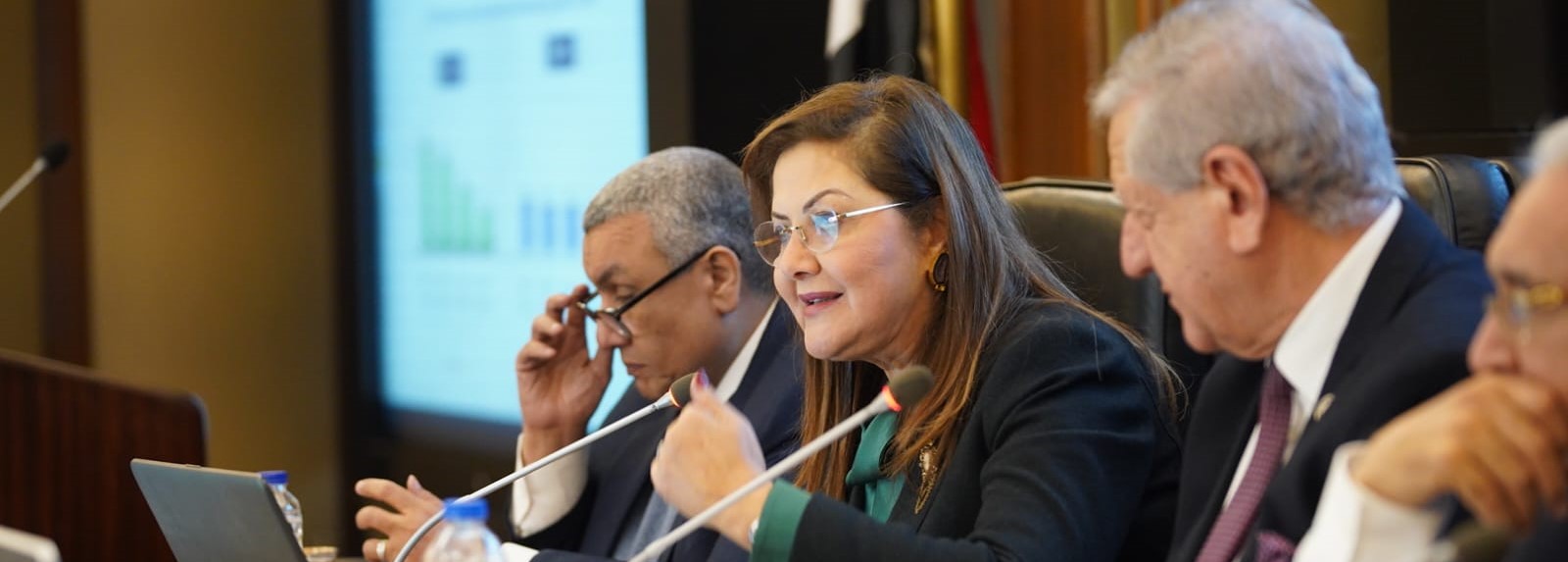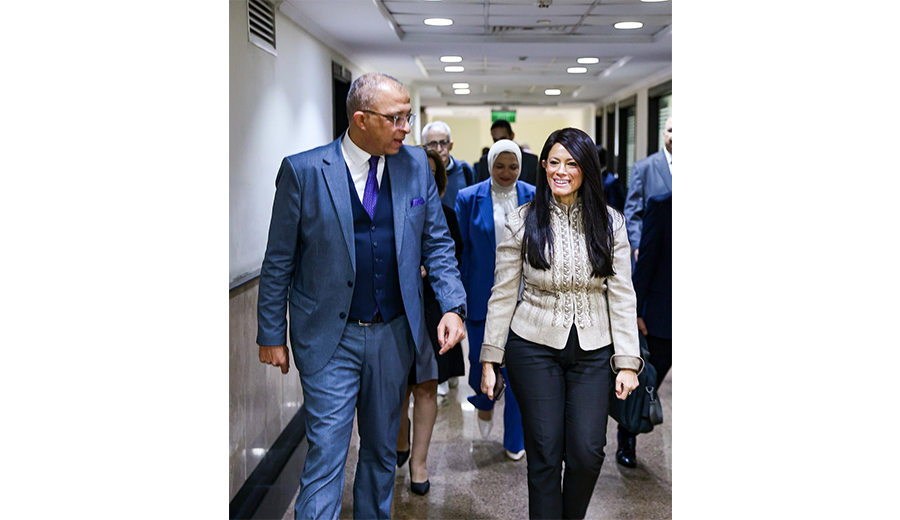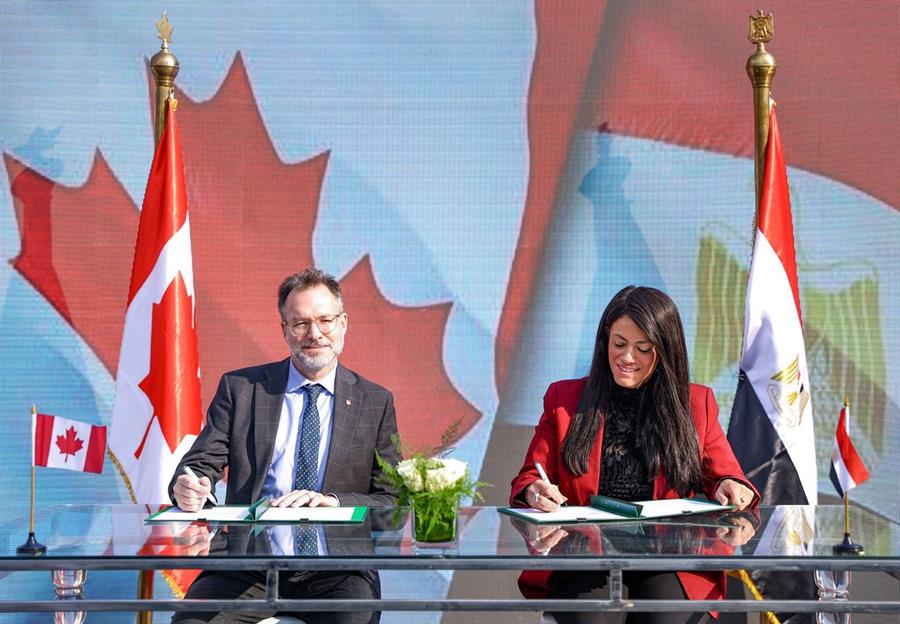Egypt's Economic Milestones Unveiled: Minister El-Said Delivers Robust Fiscal Report for FY 2023/2022

03 January 2024
Dr. Hala El-Said, Minister of Planning and Economic Development, presented today the comprehensive implementation report of the state's economic and social development plan for the fiscal year 2023/2022 before the Planning and Budget Committee of the Parliament.
The session, chaired by Dr. Fakhry El-Feky, included committee members and esteemed figures within the ministry, namely Dr. Jameel Helmi, the minister's assistant for sustainable development plan affairs, Dr. Mona Essam, the minister's assistant for sustainable development, Eng. Nahed Morsi, the minister's assistant for infrastructure affairs, Dr. Mohamed Maghrabi, head of the regional planning sector, Ismail Youssef, head of the plan preparation and monitoring sector, General Mohamed El-Gebali, the minister's advisor for political communication, Ayman Soliman, the executive director of The Sovereign Fund of Egypt (TSFE).
Dr. El-Said addressed global challenges, encompassing the impact of the COVID-19 pandemic, geopolitical uncertainties, disruptions in supply chains, escalating shipping costs, goods scarcity, inflation, and climate crises.
She underscored Egypt's resilience during the COVID-19 pandemic, focusing on critical areas such as food security, technology investment, digital transformation, and healthcare. Dr. El-Said emphasized Egypt's success in attracting foreign direct investments within the African continent.
El-Said highlighted the robust growth of GDP from 5.6 trillion EGP in 2018/19 to an impressive 10.2 trillion EGP in the fiscal year 2023/2022, surpassing the targeted 9.2 trillion.
Sectoral performance indicators were notably strong, with significant growth recorded in sectors such as restaurants and hotels (28%), the Suez Canal (18.4%), and communications and information technology (16.3%).
Regarding inflation rates, Dr. El-Said anticipated a reduction, particularly with initiatives aimed at curbing commodity prices.
A slight decline in inflation was observed in September 2023, with the recorded inflation rate standing at approximately 24.8% in 2023/22. Concurrently, the unemployment rate decreased from 19.2% to 17.3% for females.
Dr. El-Said provided an insightful overview of executed investments in the fiscal year 2023/22, with the investment rate reaching around 13%, targeting 15.2%. The minister accentuated the pivotal role of the private sector in augmenting investment rates, presenting a structural breakdown where government investments accounted for 74.5%, and private investments constituted 25.5%.
She reiterated the goal to surpass 30% private investment this year, aiming for 60% by 2027.
Concerning the sectoral distribution of total implemented investments for 2023/22, Dr. El-Said elucidated that agriculture and land reclamation comprised about 4.2%, utilities about 15.8%, and education, health, and social services about 22.7%.
The minister also detailed completed projects across various sectors, encompassing healthcare, education buildings, local administration, roads, lighting, environmental improvement, and water resources.
Dr. El-Said delved into the evaluation of achievements in realizing sectoral development targets, providing specific insights into infrastructure projects, agricultural exports, tourism revenue, export opportunities, river transport, and the establishment of new and upgraded youth centers.
The "Decent Life" initiative took center stage in Dr. El-Said's discourse, with an allocation of 350 billion EGP for its inaugural phase. She highlighted the government's strategic decision to refrain from initiating new projects unless absolutely necessary, prioritizing the completion of essential ongoing projects.
Dr. El-Said announced the commencement of an initiative to regulate population growth rates, with a specific focus on provinces contributing to effective population control.
Furthermore, she expounded on the launch of an initiative to incentivize outstanding performance in public investment management at the local level.
Provinces excelling in feasibility studies, participatory planning, self-resource development, transparency, and disclosure systems stand to receive financial incentives totaling approximately 10% of the investment plan's value.
Dr. El-Said noted that 13 provinces achieved a rating of 75% or more, and 6 provinces achieved a 100% rating, thereby earning monetary prizes.
The minister reiterated that the primary goal of investments lies in their efficiency and tangible benefits to citizens.
Dr. El-Said underscored completed projects across various sectors during the fiscal year (2023/22), including 26 hospitals in the health sector, nearly 10,000 classrooms for the educational buildings authority, 1182 road paving projects, 485 lighting projects, and initiatives supporting local units and environmental improvements.
Additionally, she highlighted the total length of paved roads reaching 1907 kilometers at a cost of around 4.39 billion EGP, along with completed projects in water resources and irrigation totaling 286 projects with a cost of 6.4 billion EGP.
Dr. El-Said also addressed the evaluation of achievements in implementing sectoral development targets, including the completion of aerial transmission lines, lining and rehabilitating water channels, surpassing agricultural export targets, achieving tourism revenues, export opportunities, and river transport tonnage.
Dr. El-Said further discussed the rationalization of investment spending during 2023/22, highlighting government decisions to avoid initiating new projects unless absolutely necessary. She reiterated the commitment to cost-effectiveness, scrutinizing foreign currency spending, and ensuring that all projects are supported by comprehensive feasibility studies.
In conclusion, Dr. Hala El-Said announced a special initiative to regulate population growth rates in the current year, directed towards provinces that actively contribute to controlling population growth.









